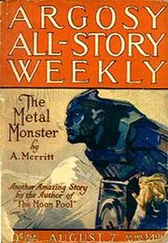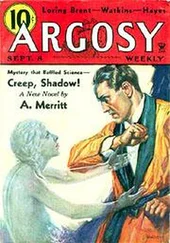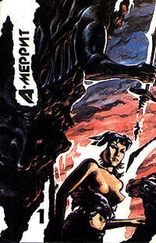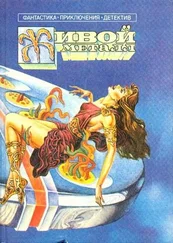Абрахам Меррит - Burn, Witch, Burn!
Здесь есть возможность читать онлайн «Абрахам Меррит - Burn, Witch, Burn!» весь текст электронной книги совершенно бесплатно (целиком полную версию без сокращений). В некоторых случаях можно слушать аудио, скачать через торрент в формате fb2 и присутствует краткое содержание. Год выпуска: 1932, Жанр: Ужасы и Мистика, на английском языке. Описание произведения, (предисловие) а так же отзывы посетителей доступны на портале библиотеки ЛибКат.
- Название:Burn, Witch, Burn!
- Автор:
- Жанр:
- Год:1932
- ISBN:нет данных
- Рейтинг книги:4 / 5. Голосов: 1
-
Избранное:Добавить в избранное
- Отзывы:
-
Ваша оценка:
- 80
- 1
- 2
- 3
- 4
- 5
Burn, Witch, Burn!: краткое содержание, описание и аннотация
Предлагаем к чтению аннотацию, описание, краткое содержание или предисловие (зависит от того, что написал сам автор книги «Burn, Witch, Burn!»). Если вы не нашли необходимую информацию о книге — напишите в комментариях, мы постараемся отыскать её.
Burn, Witch, Burn! — читать онлайн бесплатно полную книгу (весь текст) целиком
Ниже представлен текст книги, разбитый по страницам. Система сохранения места последней прочитанной страницы, позволяет с удобством читать онлайн бесплатно книгу «Burn, Witch, Burn!», без необходимости каждый раз заново искать на чём Вы остановились. Поставьте закладку, и сможете в любой момент перейти на страницу, на которой закончили чтение.
Интервал:
Закладка:
condition. She takes tea with the doll-maker and is accidentally scalded. Naturally this arouses the
solicitude of her hostess and she dresses the scald with some unguent in whose efficacy she believes. And
that is all. Where in this entirely commonplace sequence of events is there evidence that Walters was
hypnotized? Finally, assuming that she was hypnotized, what evidence is there of motive?"
"She herself gave it," he said, "'to make a doll of you, my dear!'"
I had almost convinced myself by my argument, and this remark exasperated me.
"I suppose," I said, "you want me to believe that once lured into the shop, Walters was impelled by
occult arts to return until this Madame Mandilip's devilish purpose was accomplished. That the
compassionate shop-girl tried to save her from what the old melodramas called a fate worse than
death-although not precisely the fate they meant. That the doll she was to be given for her niece was the
bait on the hook of a sorceress. That it was necessary she be wounded so the witch's salve could be
applied. That it was the salve which carried the unknown death. That the first trap failing, the accident of
the tea-kettle was contrived and was successful. And that now Walters' soul is fluttering inside the witch's
mirror, just as she had dreamed. And all this, my dear Braile, is the most outrageous superstition!"
"Ah!" he said obliquely. "So those possibilities did occur to you after all? Your mind is not so fossilized as
a few moments ago I supposed."
I became still more exasperated.
"It is your theory that from the moment Walters entered the store, every occurrence she has narrated was
designed to give this Madame Mandilip possession of her soul, a design that was consummated by
Walters' death?"
He hesitated, and then said: "In essence-yes."
"A soul!" I mused, sardonically. "But I have never seen a soul. I know of no one whose evidence I would
credit who has seen a soul. What is a soul-if it exists? It is ponderable? Material? If your theory is
correct it must be. How could one gain possession of something which is both imponderables and
nonmaterial? How would one know one had it if it could not be seen nor weighed, felt nor measured, nor
heard? If not material, how could it be constrained, directed, confined? As you suggest has been done
with Walters' soul by this doll-maker. If material, then where does it reside in the body? Within the brain?
I have operated upon hundreds and never yet have I opened any secret chamber housing this mysterious
occupant. Little cells, far more complicated in their workings than any machinery ever devised, changing
their possessor's mentality, moods, reason, emotion, personality-according to whether the little cells are
functioning well or ill. These I have found, Braile-but never a soul. Surgeons have thoroughly explored
the balance of the body. They, too, have found no secret temple within it. Show me a soul, Braile, and I'll
believe in Madame Mandilip."
He studied me in silence for a little, then nodded.
"Now I understand. It's hit you pretty hard, too, hasn't it? You're doing a little beating of your own
against the mirror, aren't you? Well, I've had a struggle to thrust aside what I've been taught is reality and
to admit there may be something else just as real. This matter, Lowell, is extra-medical, outside the
science we know. Until we admit that, we'll get nowhere. There are still two points I'd like to take up.
Peters and the Darnley woman died the same kind of death. Ricori finds that they both had dealings with
a Madame Mandilip-or so we can assume. He visits her and narrowly escapes death. Harriet visits her,
and dies as Darnley and Peters did. Reasonably, therefore, doesn't all this point to Madame Mandilip as
a possible source of the evil that overtook all four?"
"Certainly," I answered.
"Then it must follow that there could have been real cause for the fear and forebodings of Harriet. That
there could exist a cause other than emotionalism and too much imagination-even though Harriet were
unaware of these circumstances."
Too late I realized the dilemma into which my admission had put me, but I could answer only in the
affirmative.
"The second point is her loss of all desire to return to the doll-maker after the teapot incident. Did that
strike you as curious?"
"No. If she were emotionally unstable, the shock would automatically set itself up as an inhibition, a
subconscious barrier. Unless they are masochists, such types do not like to return to the scene of an
unpleasant experience."
"Did you notice her remark that after the scalding, the woman did not accompany her to the door of the
store? And that it was the first time she had neglected to do so?"
"Not particularly. Why?"
"This. If the application of the salve constituted the final act, and thereafter death became inevitable, it
might be highly embarrassing to Madame Mandilip to have her victim going in and out of her shop during
the time it took the poison to kill. The seizure might even take place there, and lead to dangerous
questions. The clever thing, therefore, would be to cause the unsuspecting sacrifice to lose all interest in
her; indeed, feel a repulsion against her, or even perhaps forget her. This could be easily accomplished by
post-hypnotic suggestion. And Madame Mandilip had every opportunity for it. Would this not explain
Harriet's distaste as logically as imagination-or emotionalism?"
"Yes," I admitted.
"And so," he said, "we have the woman's failure to go to the door with Harriet that day explained. Her
plot has succeeded. It is all over. And she has planted her suggestion. No need now for any further
contact with Harriet. She lets her go, unaccompanied. Significant symbolism of finality!"
He sat thinking.
"No need to meet Harriet again," he half-whispered, "till after death!"
I said, startled: "What do you mean by that?"
"Never mind," he answered.
He crossed to the charred spot upon the floor and picked up the heat-blasted crystals. They were about
twice the size of olive pits and apparently of some composite. He walked to the table and looked down
upon the grotesque figure with its skeleton ribs.
"Suppose the heat melted it?" he asked, and reached over to lift the skeleton. It held fast, and he gave it a
sharp tug. There was a shrill twanging sound, and he dropped it with a startled oath. The thing fell to the
floor. It writhed, the single wire of which it was made uncoiling.
Uncoiling, it glided over the floor like a serpent and came to rest, quivering.
We looked from it to the table.
The substance that had resembled a sprawling, flattened, headless body was gone. In its place was a film
of fine gray dust which swirled and eddied for a moment in some unfelt draft-and then, too, was gone.
CHAPTER X: NURSE'S CAP AND WITCH'S LADDER
"She knows how to get rid of the evidence!"
Braile laughed-but there was no mirth in his laughter. I said nothing. It was the same thought I had held
of McCann when the doll's head had vanished. But McCann could not be suspected of this. Evading any
further discussion of the matter, we went to the Annex to see Ricori.
There were two new guards on watch at his door. They arose politely and spoke to us pleasantly. We
entered softly. Ricori had slipped out of the drug into a natural sleep. He was breathing easily, peacefully,
in deep and healing slumber.
His room was a quiet one at the rear, overlooking a little enclosed garden. Both my houses are
Читать дальшеИнтервал:
Закладка:
Похожие книги на «Burn, Witch, Burn!»
Представляем Вашему вниманию похожие книги на «Burn, Witch, Burn!» списком для выбора. Мы отобрали схожую по названию и смыслу литературу в надежде предоставить читателям больше вариантов отыскать новые, интересные, ещё непрочитанные произведения.
Обсуждение, отзывы о книге «Burn, Witch, Burn!» и просто собственные мнения читателей. Оставьте ваши комментарии, напишите, что Вы думаете о произведении, его смысле или главных героях. Укажите что конкретно понравилось, а что нет, и почему Вы так считаете.

![Абрахам Меррит - Лунный бассейн [Лунная заводь]](/books/20623/abraham-merrit-lunnyj-bassejn-lunnaya-zavod-thumb.webp)









